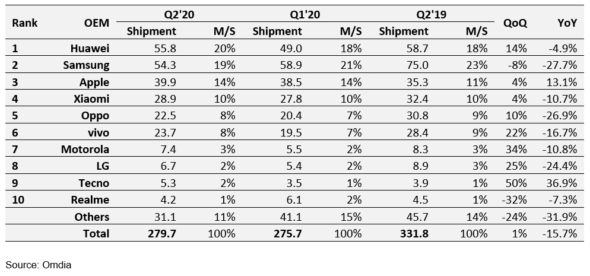
With countries and regions tackling different phases of the pandemic, smartphone OEMs have seen their performance impacted by the situation in individual markets. This has resulted shipment declining from 331.8 million units in the second quarter of 2019 to 279.7 million units in the second quarter of 2020 – a 15.7 percent decline year-over-year.
Omdia says that, for most OEMs, the second quarter was another quarter of negative growth, with Apple the most successful in navigating the marketplace. The company expanded shipments by 13.1 percent on the back of its iPhone 11 and iPhone SE products.
The data also indicates that Huawei has surpassed Samsung to reach the top spot for the first time. Huawei shipped 55.8 million units in the second quarter of 2020, whereas Samsung shipped 54.3 million units. Omdia points to China’s quick recovery after the pandemic’s initial wave as the driver behind Huawei’s small decline of only 4.9 percent compared to the 58.7 million units the company shipped in the second quarter of 2019.
Omdia says that, despite facing continued sanctions from the US government, Huawei has been able to mitigate impacts on its international business enough to compete with Samsung and finally claim the global top spot. The performance of individual smartphone OEMs is shown in the below table.

The data also shows there could be an ongoing challenge for smartphone OEMs. Although many countries have lifted some restrictions on movement and business activities, and others are working towards a return to normal, other countries still continue to be in the midst of the initial outbreak. There are also signs of potential new outbreaks in countries where the virus has been brought under control.
In this continued environment of uncertainty, Omdia says the smartphone market will continue to be impacted in third and fourth quarters of 2020.
